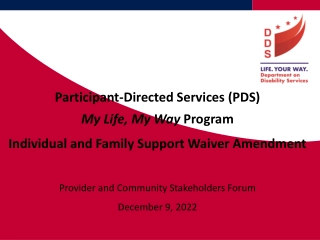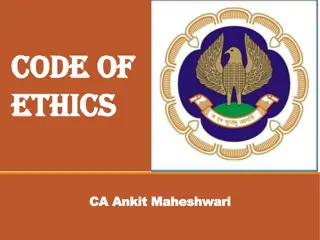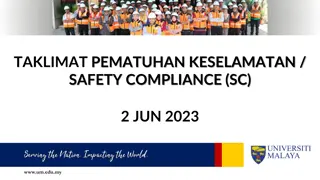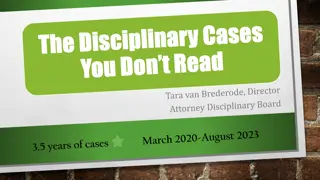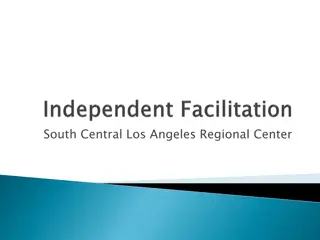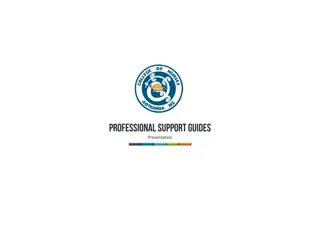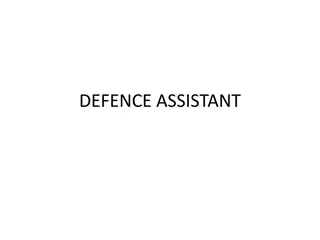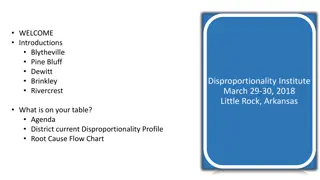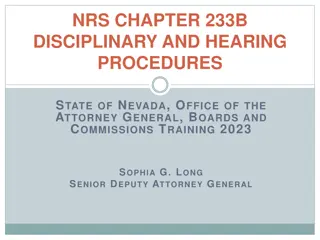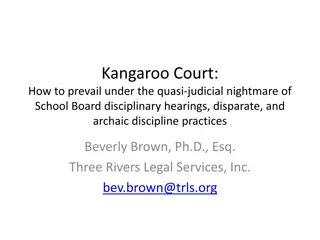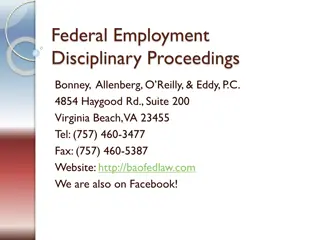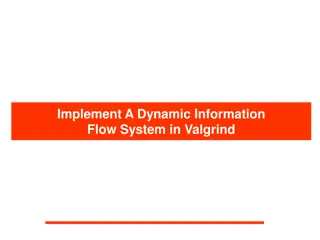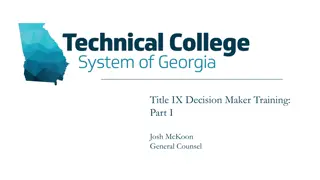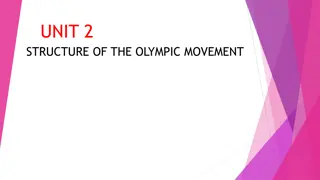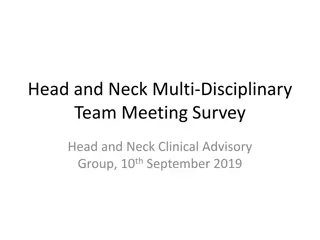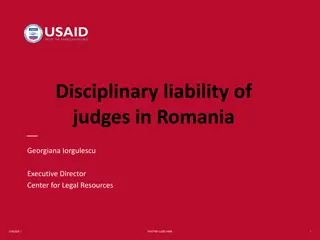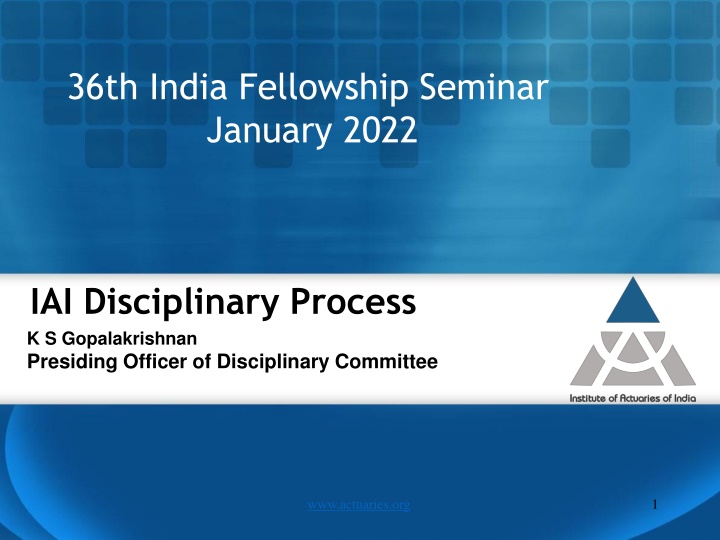
IAI Disciplinary Process: Understanding the Profession and Legislation
Explore the 36th India Fellowship Seminar focusing on the IAI Disciplinary Process chaired by K.S. Gopalakrishnan. Discover the importance of ethical standards, profession definition, legislation, disciplinary committees, and more. Comprehend the role of a profession, codes of ethics, legislation requirements for IAI members, and the disciplinary framework agenda.
Download Presentation

Please find below an Image/Link to download the presentation.
The content on the website is provided AS IS for your information and personal use only. It may not be sold, licensed, or shared on other websites without obtaining consent from the author. If you encounter any issues during the download, it is possible that the publisher has removed the file from their server.
You are allowed to download the files provided on this website for personal or commercial use, subject to the condition that they are used lawfully. All files are the property of their respective owners.
The content on the website is provided AS IS for your information and personal use only. It may not be sold, licensed, or shared on other websites without obtaining consent from the author.
E N D
Presentation Transcript
36th India Fellowship Seminar January 2022 IAI Disciplinary Process K S Gopalakrishnan Presiding Officer of Disciplinary Committee www.actuaries.org 1
Disciplinary Framework Agenda: 1. 2. 3. 4. 5. 6. Profession and Legislation Disciplinary Committee ( DC ) Powers of Council AppellateAuthority Miscellaneous Q &A
Disciplinary Framework Agenda: 1. 2. 3. 4. 5. 6. Profession and Legislation Disciplinary Committee [DC] Powers of Council AppellateAuthority Miscellaneous Q &A
What is a Profession? A Profession is a disciplined group of individuals who adhere to ethical standards and who hold themselves out as, and are accepted by the public as possessing special knowledge and skills in a widely recognised body of learning derived from research, education and training at a high level, and who are prepared to apply this knowledge and exercise these skills in the interest of others. Australian Council of Professions, 2003
What is a Profession? ..2 It is inherent in the definition of a Profession that a code of ethics governs the activities of each Profession. Such codes require behaviour and practice beyond the personal moral obligations of an individual. They define and demand high standards of behaviour in respect to the services provided to the public and in dealing with professional colleagues. Further, these codes are enforced by the Profession and are acknowledged and accepted by the community. Australian Council of Professions, 2003
Legislation - IAI Members need to know thoroughly, and comply with: 1. Provisions of the Actuaries Act, 2006* 2. Professional Conduct Standard 3. Actuarial Practice Standards 4. Guidance Notes 5. Rules and Regulations and Directions Ignorance is not excused! * In particular, read Section 31 and the Schedule
Disciplinary Framework Agenda: 1. 2. 3. 4. 5. 6. Profession and Legislation Disciplinary Committee [DC] Powers of Council AppellateAuthority Miscellaneous Q &A
Disciplinary Process - Example https://www.youtube.com/watch?v=CEhcFJ10Jhk&feature=emb_title
Disciplinary Committee Formed under Section 26 of the Actuaries Act 2006 Actuaries (Procedure of Enquiry of Professional and Other Misconduct) Rules, 2008 lays down detailed procedure for dealing with complaints/information Disciplinary Committee, Prosecution Director and Appellate Authority have powers of Civil Court (Section 28 of the Actuaries Act 2006) Key aspects Prima facie opinion of Prosecution Director Possible hearing calling upon defendant, complainant, witnesses and PD Arrives at a finding (guilty or not) Sends report to the Council
Disciplinary Framework Agenda: 1. 2. 3. 4. 5. 6. Profession and Legislation Disciplinary Committee [DC] Powers of Council AppellateAuthority Miscellaneous Q &A
Council If satisfied with the DC report and finds member guilty Give the member a reasonable opportunity of being heard If found guilty reprimand / remove temporarily / remove permanently / penalty not exceeding Rs 5 lacs Send it back to the DC if not satisfied with the report If disagrees with the findings of the DC appeal to the Appellate Authority itself or direct the PD to do so Sections 29 and 30 of the Act
Disciplinary Framework Agenda: 1. 2. 3. 4. 5. 6. Profession and Legislation Disciplinary Committee [DC] Powers of Council AppellateAuthority Miscellaneous Q &A
Appellate Authority Any member of the Institute aggrieved by any order of the Council imposing on him any of the penalties referred to in section 30, may, within 90 days of the date on which the order is communicated to him, prefer an appeal to the Authority: Provided that the Authority may entertain any such appeal after the expiry of the said period of 90 days, if it is satisfied that there was sufficient cause for not filing the appeal in time. Section 36 of the Act
Appellate Authority The Authority may, after calling for the records of any case, revise any order made by the Council under Section 30 and may- (a) (b) confirm, modify or set aside the order; impose any penalty or set aside, reduce or enhance the penalty imposed by the order; remit the case to the DC for such further inquiry as the Authority considers proper in the circumstances of the case; or pass such other order as the Authority thinks fit: provided that the Authority shall give an opportunity of being heard to the parties concerned before passing any order. (c) (d) Section 36 of the Act
Disciplinary Framework Agenda: 1. 2. 3. 4. 5. 6. Profession and Legislation Disciplinary Committee [DC] Powers of Council AppellateAuthority Miscellaneous Q &A
Miscellaneous The Council publishes the disciplinary cases in its website, and/or the Actuary India Magazine, being member of the International Actuarial Association. The purpose includes educating the members on how to act professionally and not to commit such mistakes. Anonymous complaints are not entertained. Members can be charged in relation to matters other than professional misconduct.
Conclusion The process is in existence to protect the public and the integrity of the actuarial profession. The process is documented in the legislation and must be followed. Every member is a brand ambassador of the profession. There is thus a huge responsibility on every member to follow the standards in letter and spirit. When in doubt consult another member with relevant experience before it is too late. It is worth reading past cases of IAI and other actuarial bodies.
Disciplinary Framework Agenda: 1. 2. 3. 4. 5. 6. Profession and Legislation Disciplinary Committee [DC] Powers of Council AppellateAuthority Miscellaneous Q &A

